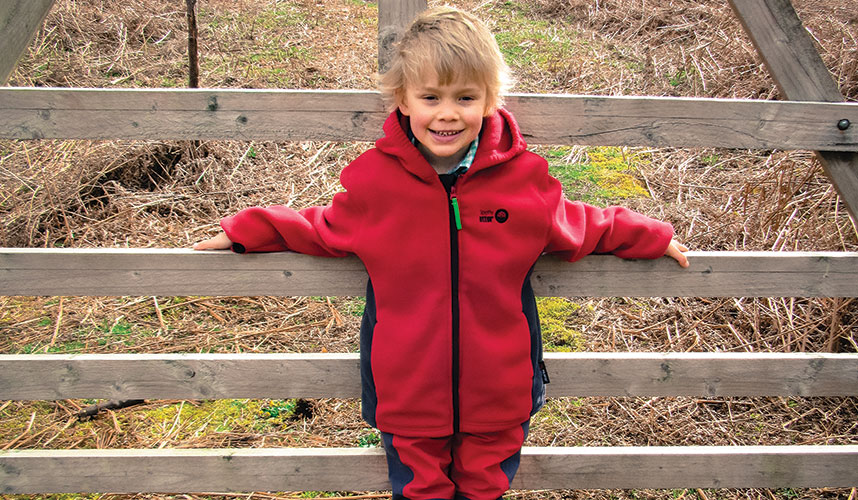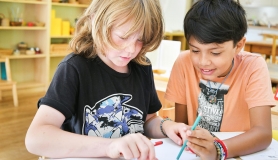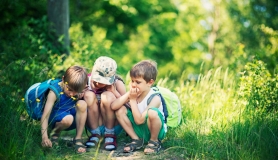When Ewan was young, we found a small, nurturing playgroup in the Peak District, which offered regular forest school sessions. This changed our lives. Ewan happily attended the playgroup for two years and our daughter Tessa also started attending when she was two years old. I trained as a forest-school practitioner with support from the playgroup and have since worked there as a forest-school assistant.
When Ewan left playgroup, we were heading into the unknown territory of home-education. My husband and I both attended school when we were children and I trained as a state primary-school teacher when I was in my twenties. Fuelled with negativity from certain members of my family and living in a schooled nation, at times I have experienced major doubts about what we are doing.
LIFE LESSONS
Through home education I have learnt a huge amount about myself, my family and society. These are the most valuable life lessons: Look to my children for answers, for they teach me more than any other source ever can. The second is that everything we offer our children is a potential learning experience. The world truly is our classroom!
No two weeks look the same for us as a home-educating family. There are countless opportunities in the local home-educating community, making our lives very busy. In order for my husband and I to work and to home-educate, my parents help out a lot, taking the children to various groups and caring for them. Their help is invaluable. I also receive support from my husband, who does a huge amount of outdoor learning with the children at the weekends and helps in the week when he can.
We spend between one and two days per week at home, where Ewan does some more formal, focused activities, such as reading, writing, playing the piano and art work. He also pursues longer-term projects, such as space and gardening. We also go on a variety of day trips, for example to National Trust properties, educational and historical centres and museums. Our most recent outing was an outreach day at the University of Sheffield, where Ewan was a scientist for a day! All of these add value, interest and variety to our lives, as well as providing opportunities to socialise with other home-educating families.
We are an active, outdoor-based family, who travel and go on lots of adventures, so the children are often camping, cycling, climbing and mountain walking. We have travelled as far away as Shetland, North America, Nepal and Bali with our young children. Home-education offers us a more flexible lifestyle, which means we can travel on big trips during term-time. We also go on adventures closer to home, including wild-camping in the Lake District and local cycle-camping. We ‘do’ home education anywhere, at any time. Ewan also attends local groups and classes, including Beavers, swimming and piano lessons, all of which are of great value to his development, as well as being very enjoyable for him.
SUPPORT NETWORKS
Building a community, support and information network of like-minded people who also home-educate has been essential for me. Through attending local groups I have learnt that no two home educating families are the same; in fact they vary as much as any family in society does because they are simply families who, for a huge variety of reasons, do not send their children to school.
FOREST SCHOOL AND MONTESSORI
Ewan attends a weekly forest school session for home-educated children, in The Secret Woods, run by a local social enterprise company called Creative Explorer. Ewan has made great progress at Forest School over the past two years, especially in terms of his emotional and social development. The group is a special, fun and integral part of his weekly routine. We are fortunate this group is based locally, that it is set in such beautiful woodland and is run by two committed, nurturing members of staff who really understand home-education and children.
More recently, Ewan started attending Pinecones Montessori group, which offers full days education in a home setting for up to ten children, following the Montessori method of education. The child-led ethos of the method really appealed to me. Ewan has settled well into the group, attending two days per week. We are excited about how the group may develop in the future. Tessa has also recently started attending and I am now a member of staff here one day per week.
“We are constantly learning alongside our children, for they really are our greatest teachers”
BEING EWAN’S GUIDE
It is a true privilege to be with my son in these formative years, spending so much time with him. Ewan constantly challenges my perceptions, allowing me to look at the world anew, as he repeatedly questions and enquires. His thirst for knowledge is daunting at times: he is never still. We learn together, discovering new topics which open up new worlds. I am more his guide or facilitator than a traditional teacher who possess knowledge to impart to the pupil. I provide the opportunities and resources to allow Ewan to learn for himself.
LIFESTYLE CHOICES
Home-education is a viable option for us, because I am able to stay-at-home and only work part-time. I am able to develop my career working with children because I work in two forest schools and in a Montessori group, all of which my children attend. I am very fortunate to be able to work in the same settings that my children attend. My teaching career has happily veered away from primary-school teaching to more alternative methods of education, which I find fulfilling and very enjoyable. I am truly grateful we are taking this more unconventional educational path. At times I feel overwhelmed and exhausted by how much we do and the responsibility we have, yet if Ewan was in school I am sure I would feel similar emotions, just for different reasons.
How does Ewan feel about being home educated? He recently said ‘I like home education because I get to spend more time with mummy’. He also says he cannot comment about school because he has never been, so doesn’t know what it would be like.
There are times when I struggle with the dynamic of being both a mother and educator. Yet I have a supportive husband who is truly my anchor. I couldn’t have taken this path without his support and quiet guidance. And it is my children who are the wheels steering the way. I am excited for the future; for the new modes of learning becoming available in the second and third decades of the twenty-first century. Many families are calling for more flexible, individualised learning provision, for no one size fits all approach exists in education, just as it doesn’t with parenting in general. To have a hand in shaping my children’s futures is exhilarating, as well as terrifying! It is also a great privilege.
I can now confidently look people in the eye and proudly say to the people who ask ‘which school does Ewan go to?’, that we home-educate. Most responses to my reply are positive. At the very least, people are interested; although some express disbelief I can spend so much time with my children. It does take energy and commitment to home-educate, but I would have it no other way.
There are few easy choices in life when it comes to our children. We are constantly learning alongside them, for they really are our greatest teachers. Ewan is thriving. He may be ‘behind’ in government created educational targets, but who can quantify wellbeing, so finely enmeshed with learning? Ewan is progressing in his own time and at his own pace. We look forward to the next few years as parents of two amazing and spirited home-educated children, to the many challenges and joys on the road ahead.
MORE INSPIRATION
READ Caroline’s blog stoneageparenting.com
WHAT IS A FOREST SCHOOL?
In a nutshell Forest Schools take learning outdoors for a part of the day. This may involve exploring the woods as a group and collecting treasures, building a den or simply taking your lesson outdoors away from the classroom. The development of Forest Schools began in 1993, and is based on a Scandinavian idea that recognises the importance of children’s contact with nature.
Many schools have now added this to their curriculum and a growing number of organisations are also getting involved to spread awareness of the advantages it brings.
Ten of the benefits of forest learning:
- Confidence - Forest School helps children to grow in confidence as a result of the freedom, time and space they are given in their learning. This allows them to demonstrate independence at each individual child’s rate.
- Social skills - Activities such as sharing tools and participating in play help teach the children to work together as a group, which strengthens their bonds and social ties.
- Communication - The sensory experiences provided by Forest Schools helps prompt language development. Improving communication skills has a positive effect on a child’s self-esteem and is a crucial part of their development.
- Motivation and concentration - High levels of interest lead to high levels of attention. Spending time in the woodland is exciting for a child. It tends to fascinate them which develops a strong will to participate and concentrate over long periods of time.
- Physical skills - The increase in outdoor activity is bound to have a positive physical impact. Not only does the development of physical stamina improve but also gross and fine motor skills.
- Knowledge and understanding - Children develop an interest in the great outdoors and respect for the environment. Encouraging children to develop a relationship with the natural world will help in protecting the environment for generations to come.
- New perspectives - Forest School isn’t just beneficial to children it is also beneficial to teachers. Observing their class in a different setting allows them to gain a new perspective and understanding of their class.
- Ripple effects - When children really engage with Forest Schools they will take their experiences home to share with friends and family. This will often encourage families to visit their local woodlands more frequently.
- Levels the playing field - Taking children outside of the classroom removes the pressures of academia and allows them to play to their strengths. This is beneficial to children who struggle in the classroom because there is more of an opportunity for them to learn at their own pace.
- Enjoyable for the children - Forest Schools are fun! It is educational whilst also allowing children to play, explore and discover. Children who participate in Forest Schools are generally observed to be happier. The fresh air, the excitement, getting mucky – it doesn’t get child friendlier than that.







